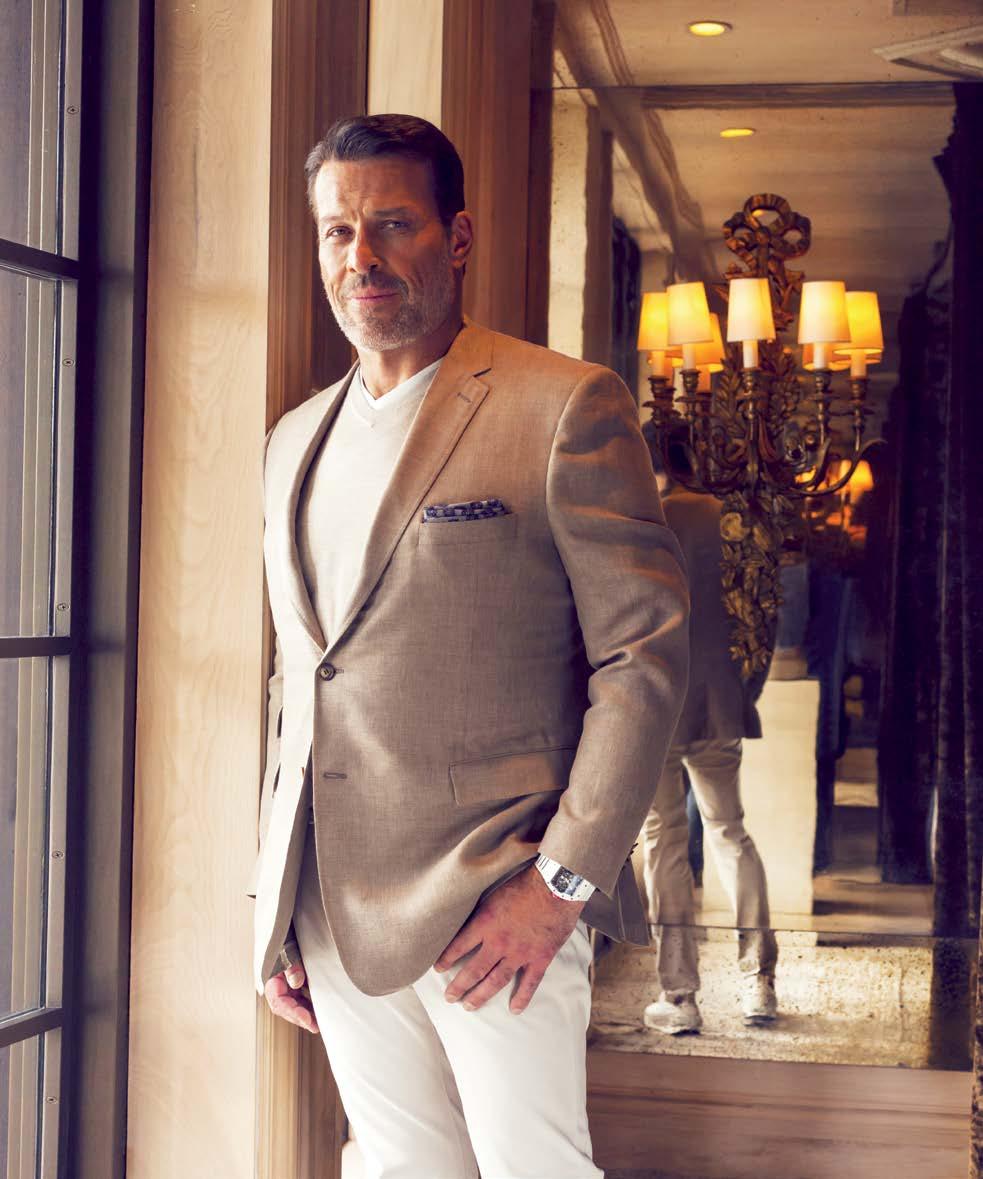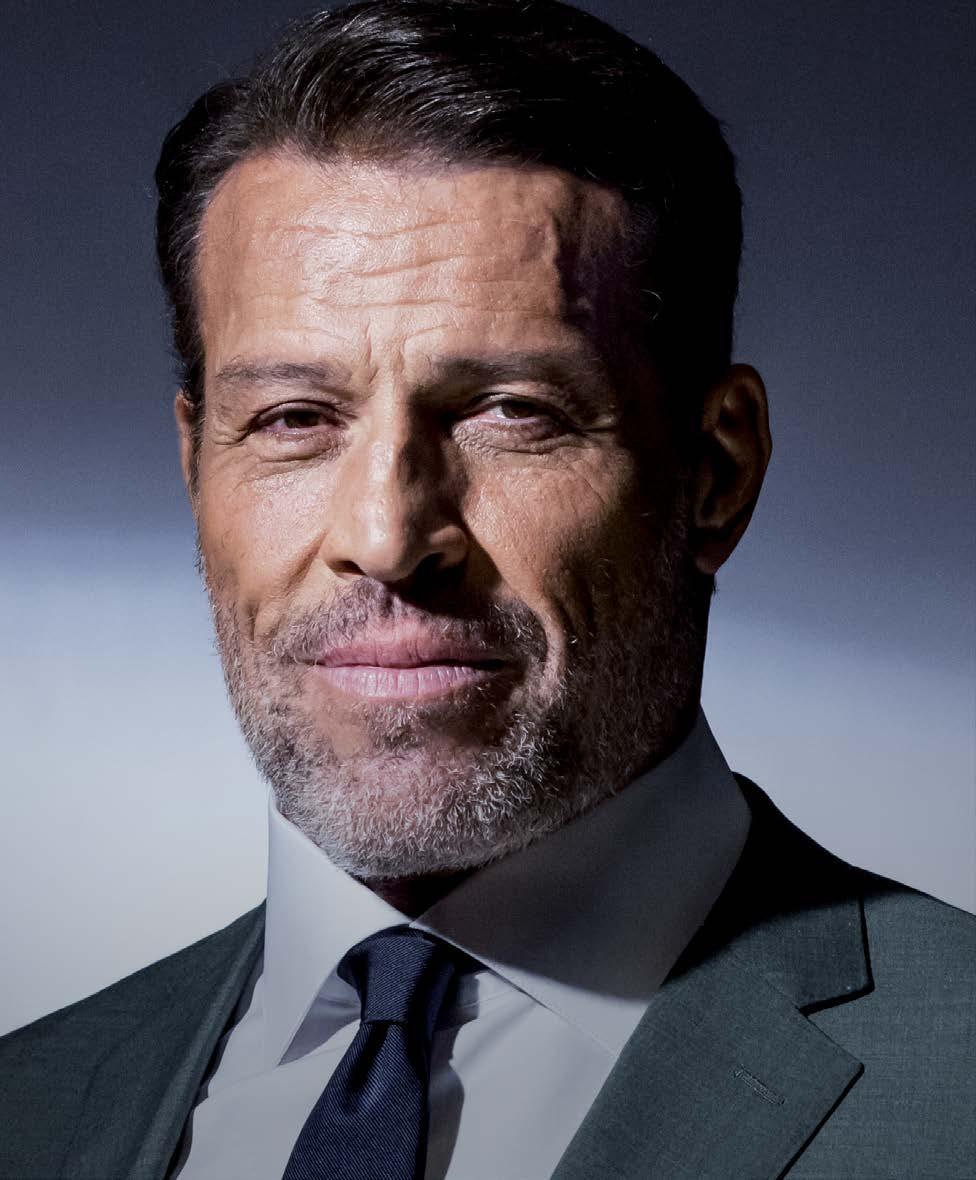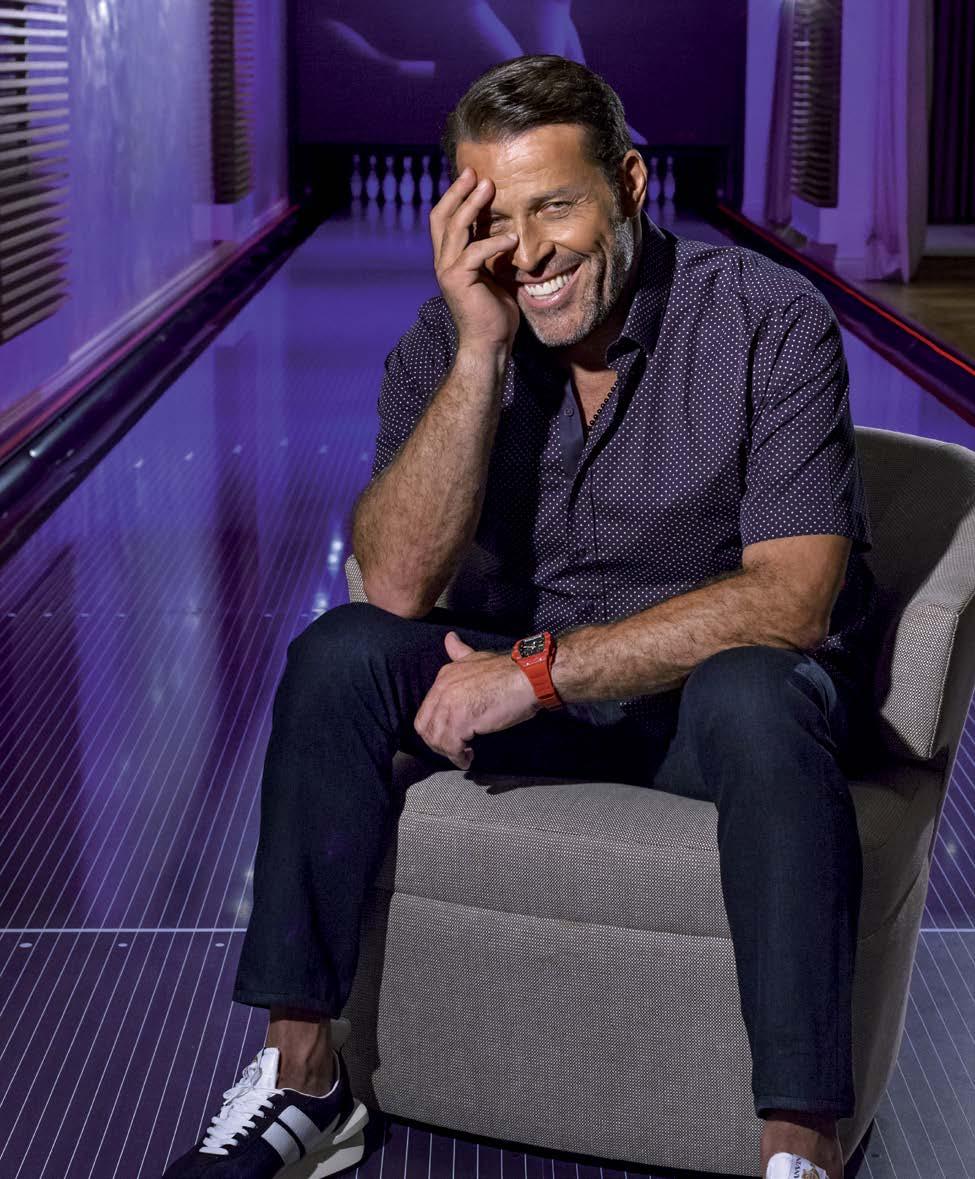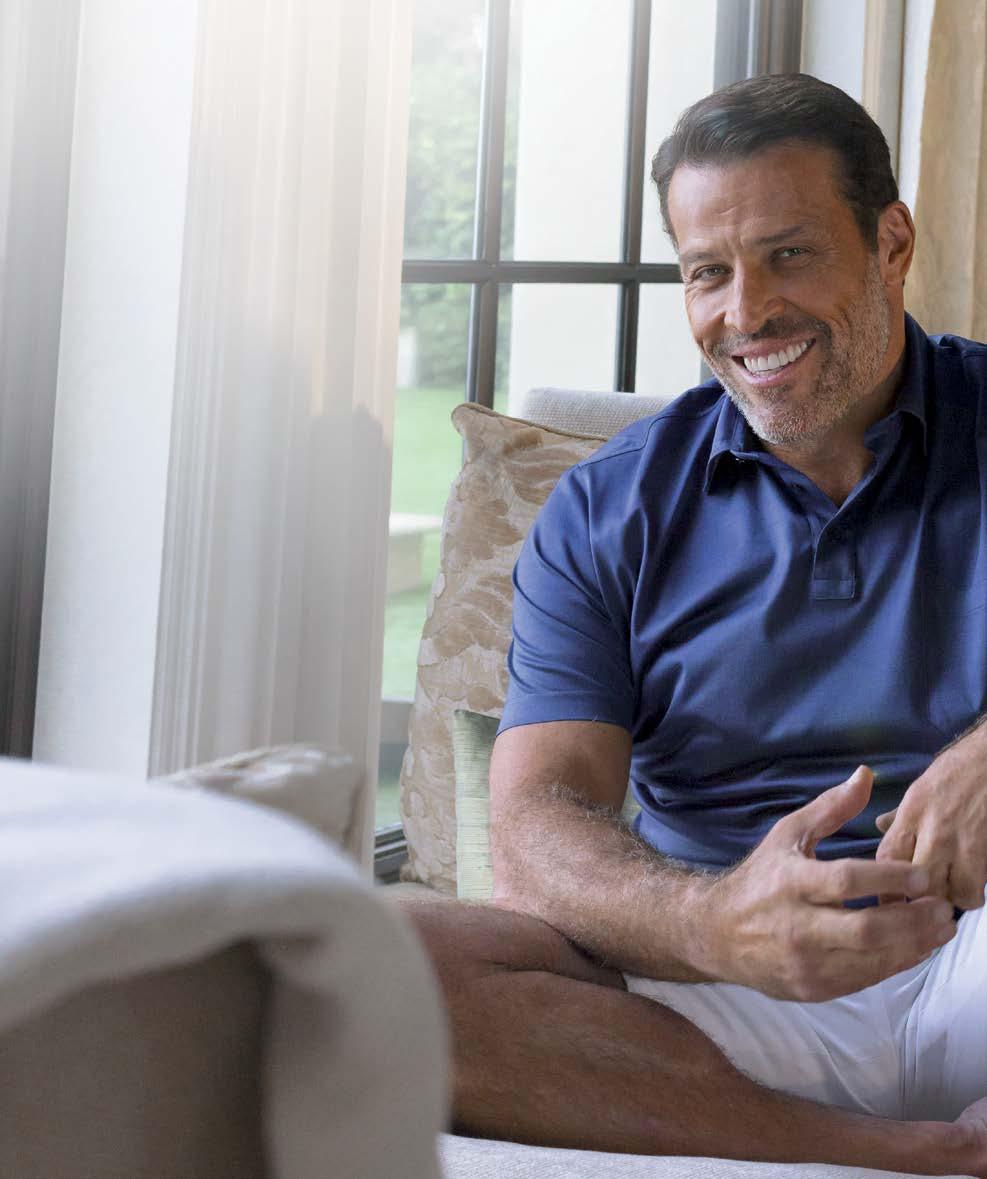
16 minute read
COVER STORY
DON’T GIVE UP, GIVE BACK
PHILANTHROPY IS PART OF TONY ROBBINS’ DNA. HERE, HE SHARES HOW SELFLESSNESS SHAPED HIS SELF-AWARENESS, HIS BUSINESS AND HIS FUTURE.
BY LAURA SCHREFFLER PHOTOGRAPHY NAVID HAIR ARTHUR PRUDOT THE BOHÈM OF WEST PALM BEACH, FL SHOT AT ROBBINS’ HOME IN PALM BEACH


I
In the span of an hour, Tony Robbins has cried three times (and, true confession, I was right there with him). We’re talking about how the past has shaped his present, and shit has gotten deep.
We’re Zooming, naturally. It is still a pandemic-era world, and the 61-year-old world-renowned entrepreneur, best-selling author, philanthropist and top life and business strategist is a big proponent of rolling with the punches and pivoting when he needs to —and that includes this Covid-friendly means of interaction. He is currently at his home in Sun Valley, Idaho (one of many globally, though his home base is Palm Beach), wearing a signature Black Clover hat; the intention behind it being to “live lucky.”
And although it might seem like he was born lucky, the opposite is actually true. He grew up poor, in a rough part of SoCal with not one but four dads (because, he says, his mom, Nikki, a drug abuser and alcoholic, kept kicking them out). But he had kindness, he had optimism, he had determination and he had belief in himself. And that, my friends, is one of the truest secrets of Tony Robbins’ success: he makes his own luck. The other is that for as much wealth as he has, he’s willing to part with it. His life would mean nothing if he didn’t give back.
“We’re caught up in a pattern where a lot of people are miserable and unhappy during one of the most abundant times in human history, and I think it’s because they’re missing what makes them feel alive, which is growth, progress,” he says. “But when you grow, you have something to give.”
Personal growth is the driving force behind his businesses, and for good reason: it is the foundation of what he has built his own life upon, particularly as it pertains to philanthropy. He recalls his first brush with the concept of charity and how it shaped him. “My mom, when she was still alive, would say, ‘He’s always been this way.’ I grew up in a pretty rough neighborhood in South Central L.A., and we were dirt-poor. My mom used to tell this story about how, when I was 4 years old, she sent me next door to this liquor store with the little bit of money we had for a loaf of bread and a quart of milk. I was gone for a very long time, and she was concerned. When I came back, it was with no bread, no milk and no money. She said, ‘Where’s the bread, where’s the milk?’ I said, ‘Well, I met a poor boy there, and so I gave him our money so he could have what he needed.’ My mom was like, ‘But we’re poor!’”
But he felt as rich as king — and that’s kind of the point.
Fast-forward seven years, and now, it’s Thanksgiving, a moment in time that he declares to be his strongest memory. At this moment in time, Robbins (née Anthony J. Mahavoric) was on dad number four, Jim, a former semiprofessional baseball player (who legally adopted him a year later, and whose last name he uses to this day). His parents were fighting, saying things that they could never take back. His father had just lost his job and was depressed. Young Tony was protecting his siblings, then-5-year-old Marcus and 7-year-old Tara, from his parents’ squabbling when he heard a knock on the door. It was a stranger, holding a pot with an uncooked turkey and two bags of groceries.
“I was out of my mind,” Robbins remembers. “We wouldn’t have starved — we had crackers, butter, spaghetti with ketchup — but we weren’t going to have a feast. I thought my dad was going to be excited, too, and I couldn’t wait to see how joyous he’d be. But he wasn’t. He said, ‘We don’t take charity,’ and he went to slam the door on the man [who wouldn’t let it happen. Instead] the man said, ‘Sir, sir, please don’t be upset. Somebody knows you’re having a tough time. Everybody has tough times. Don’t let your ego make your family suffer.’ The veins were popping out of my dad’s neck — I thought he was going to hit the guy. But instead he grabbed the groceries, slammed them down and slammed the door. He didn’t say thank you or anything, and it was horrific. I was so excited, and he was angry — which taught me a really interesting lesson for later in life. In fact, it shaped my life.”
How? It shaped his career. “This is what I teach people now. Your life can be shaped by three decisions,” he explains. “First, What are you going to do? For me, there was food. What a concept! It was a great thing. But the second question is, What does this mean? My dad and I made different decisions that day. The third decision was, What are you going to do? My dad’s focus was that he had to take care of his family — he made that crystal clear. He beat himself up about it, saying it out loud over and over again, and the meaning was that he was worthless. And what he decided to do as a result was leave our family, which, at the time, was the most brutal experience, because of all of my fathers, he was the one I really loved and adored, although he wasn’t my natural one. But for me that day, the meaning was totally different. My dad always said, ‘No one cares about anybody else.’ We lived in a community where it kind of felt that way; we were on the wrong side of the tracks. But that day, my brain was like, ‘Strangers care about me and my family. They don’t even know me. I could care about strangers, too.’ So I decided that one day, I would do the same for other people.”
When he was 17, that day came. He wasn’t successful yet — he had just begun promoting seminars for motivational speaker and mentor Jim Rohn — but he was “doing OK.” And so, on Thanksgiving that year, in a nod to his previous pivotal moment, he decided to give back by providing a holiday dinner to two underserved families in Venice, California. He called a local church and asked if there were any families who —like his dad — were too proud to accept charitable donations. He took down some names, threw on a pair of jeans, borrowed a van and wrote two notes — one in English and one in Spanish — that said Please have a beautiful Thanksgiving, and someday, if you can, pay it forward. Love, a friend. And he went on his way.
What occurred at the first house he visited — which belonged to a “tiny” Hispanic woman (I’m taking “tiny” with a grain of salt, because Robbins is larger than life in every possible way, especially his actual physical size, 6’7”) and her four boys — “changed my life.” The
mother’s reaction to his offering was priceless. She screamed, took his head in her hands and kissed him. He kept protesting, “No, no, no, I’m just the delivery guy!” but she didn’t speak English, so he gave her the letter written in Spanish. “She started crying, and she kept repeating, ‘You’re a gift from God,’” he recalls. As he was leaving, one particular moment was seared into his memory forever. “I looked back in the rearview mirror, and I see all five of them on the porch. The mom was crying, but with a giant smile on her face. The kids were smiling. But I had uncontrollable tears pouring down my face, and I thought to myself, Why is this? Why am I feeling like this is such a great moment?”
Here, Robbins genuinely does start crying (as do I — it’s hard to remain impassive or objective in the face of so much genuine, raw emotion). He collects himself, but his eyes are still shimmering as he says, “That was the moment when I realized that my worst day was my best day. That day wouldn’t be here if my father hadn’t left. I wouldn’t have had the drive to make that difference. And I decided that I was going to continue to make that difference.”
He continued to work for Rohn, even putting in a few years at California Polytechnic State University in San Luis Obispo, but he was still destitute. One night when he was 19, he was driving his 1968 Volkswagen down the 57 freeway through the rough-and-ready city of Pomona at midnight and he had an emotional breakdown. He pulled over on the side of the road, whipped out an 11x7 notebook (that he still has to this day) and wrote the words that were to become his infamous catchphrase: The secret to living is giving. “I just started crying,” he admits. “I realized that I had gotten so focused on ‘why wasn’t it working’ that I had stopped focusing on the giving.”
Six months later, despite his epiphany, he was still broke, perhaps even more so than before. He was living in a tiny bachelor apartment in Venice, watching the romance unfold between Luke and Laura on General Hospital (“shit that I would have made fun of anybody else for doing”), hiding from his creditors. “I hit my absolute threshold,” he says. “I had 22 bucks in my pocket, couldn’t pay my rent, couldn’t pay my electricity. And so I decided to go to an-all-you-can eat restaurant to ‘load up for the winter.’ I didn’t take my car because I couldn’t pay for the parking, so I walked a couple of miles [to the nearby city of Marina Del Rey]. And that’s when I had the most powerful [philanthropic experience of my life].”
The door to the restaurant slowly opened, and in walked an absolute stunner. Her date was her young son, dapper in a suit and vest, every inch the gentleman as he opened doors and pulled out his mother’s chair for her. “I just watched him,” Robbins remembers. “He was looking in her eyes; he was so present with her. It moved me so much.”
So he paid his all-you-can-eat bill of $5.95 plus tax, and he introduced himself to the kid, Charlie, praising him for his manners and applauding him for taking his mom out to lunch. The 10-year-old responded, “I can’t take her out to lunch yet, because I don’t have a job, but I’m going to when I can in the future.” Robbins says he still doesn’t know what came over him, but he reached into his pocket, took out literally all of his remaining money in the world and urged the kid to take it.
“I walked out and realized I don’t have a car there, and I looked like some silly white guy, skipping home about two miles. I was on cloud nine. But the reason I’m telling this story is that I had no money for food, no idea how to pay my bills, and I was the happiest I’d been in my entire life. I went to sleep with no plan and no fear. I can’t explain it.”
The next day, like a reciprocal gift from God, he received a handwritten apology letter from a guy he’d loaned money to and had been unsuccessfully chasing, $1,200 plus $75 interest. “But instead of being euphoric, I was just crying and crying and crying. I was like, What is this? Why did this happen? And then I realized, I think it’s because I did the right thing. I just did it because it was right, and it freed me from the scarcity I grew up with.”
He wells up again, and this time the tears dangle on his eyelashes like stars. I can see them clearly, even over Zoom. Sniffling, he says, “I’m sorry that there are tears in my eyes, because this is [still real for me]. I’m 61 years old, and all of this is happening 40 years later, but I can still feel it at that depth. I’m an empath, and that’s why I can do what I do… I’ve had many companies, and holy shit, in the early days, some near-bankruptcies. There were some scary times, but I never went back to that place I was before that moment [with Charlie]. It just made a permanent shift in me. It anchored me. I discovered what life is about. You can do well, but you can also do good, and I don’t think those two sentiments should be separated.”
Everyone in the world knows Tony Robbins’ name. Not only does the man own more than 100 companies, but for more than four decades he has touched the hearts and transformed the lives of more than 50 million people. He has worked with four U.S. presidents; top entertainers like Aerosmith, Green Day, Usher and Pitbull; athletes including tennis pro Serena Williams and UFC champion Conor MacGregor; and business leaders like Salesforce.com founder Marc Benioff and Ray Dalio, the co-CIO of the world’s largest hedge fund, Bridgewater Associates. He has penned six successful books, including the New York Times best-sellers Money: Master the Game and Unshakeable: Your Financial Freedom Playbook.
But as we’ve seen, this success wasn’t handed to him. Even when he had nothing, he gave back. But when he did have something to give, he really gave — and used his magnetic powers to urge others to do the same on a much larger scale.
Feeding two underserved families on Thanksgiving grew to 10 a year to a million, to 4 million. When SNAP (the Supplemental Nutrition Assistance Program, formerly food stamps) financing of underserved families was cut by almost a week’s worth of food a year, Robbins got the private sector involved, using his connections with the goal of providing more than a billion meals over 10 years.
“I was at a stage in my life where I had done so much work with athletes, entertainers, politicians, businesspeople, that I needed something that was going to inspire me even more,” he explains. Inspired by Robin Hood Foundation founder and financial guru Paul Tudor Jones, a longtime client, he decided to amplify his support of the nonprofit Feeding America by co-creating the 100 Million Meals Challenge and seeding the campaign by donating all the profits from Unshakeable to providing funding for 100 million meals per year through 2025. The campaign grew so successful that its goals continue to be surpassed and new ones created. The campaign, which he encourages others to contribute to, has now provided support for 800 million meals through Feeding America’s U.S. network of 200 food banks. The effort to reach a billion meals by 2025 is two years ahead of schedule.
But it wasn’t enough, so he invested in the X Prize Foundation, working with Zero Gravity Corporation CEO Peter Diamandis and Sheikh Mohammed bin Zayed, Crown Prince of Abu Dhabi, as well as the Foundation for Food & Agriculture Research, to create the $20
E

HONESTLY, IT’S HARD TO BE HAPPY IF IT’S ONLY ABOUT YOU. THE ONLY WAY UNHAPPINESS GOES AWAY IS TO FIND SOMETHING MORE THAN YOURSELF TO SERVE. WHEN YOU’RE NOT IN YOUR HEAD, YOU’RE IN YOUR HEART, AND THAT’S WHERE LIFE CHANGES, IN MY OPINION.”

million Feeding the Next Billion Xprize, with the impetus of creating new technology that would feed people around the world in healthy ways.
Robbins has built his life on service to others, so he’s hardly stopped there. “I chunk [my giving] by focusing on What are the essential needs of humanity? Food…water.”
After seeing children dying of waterborne diseases in India, he teamed up with Spring Health to provide a quarter of a million people with fresh water. When he bought a private jet, he was concerned about the impact it would have on the environment, so he hired someone to show him what his carbon footprint was. When he learned he was destroying 5,000 trees annually, he said “Screw that” and decided to to not only support the planting of 100 million trees but to work with sub-Saharan farmers to create tree farms in Africa. His goal is in sight: he’s currently at 71 million trees.
During one of his seminars, he met a woman who revealed that her mission was stopping sex trafficking. As a father of five (he also has five grandkids) who couldn’t imagine his children living through something so horrific, he immediately donated $4 million to her cause. He was also one of the largest donors to help fund the nonprofit New Story, which is building entire new communities, including one of the first 3D-printed home communities, in Nacajuca, Mexico, and another traditional one in El Espino, El Salvador.
And after a snowboarding accident caused a long-term injury to his rotator cuff, he became involved in stem cell research and was invited to the Vatican to meet with Pope Francis — who is also a proponent of this innovative science — in 2018. He’s in the process of finishing another nearly 700-page book, the proceeds of which will be donated entirely to support the work of a half dozen leading researchers and researcher’s organizations working on breakthrough alternatives for cancer, heart disease, Alzheimer’s and anti-aging. He and his foundation are also making a difference in the quality of life of youth, senior citizens, the homeless and the imprisoned population. Started in 1991, the Tony Robbins Foundation has awarded more than 2,000 grants and other resources to health and human services organizations, implemented life-changing curricula in more than 1,700 correctional facilities and provided mentorship to thousands of young leaders across the world.
He likens his charitable endeavors to how he invests in businesses: while he may not have started them, each and every one is something he’s passionate about and firmly stands behind. “I have more than 100 companies; I couldn’t have done that from scratch,” he admits. “So I started looking for, What can I bring to this company that already exists so I can turbocharge its growth? I try to do that with philanthropy as well. You’ve got to start where you are, and I think that’s the most important thing. I hear people say all the time, ‘When I’m rich, I’ll do that kind of stuff too.’ I look that person straight in the eye and say, ‘If you don’t give a dime out of a dollar, don’t bullshit yourself and tell me you’re going to give a million out of $100 million or $100 million out of $1 billion. You’re lying to yourself. Do it now and get wired for life. You’ll get a sense of meaning that comes from having a life that’s about more than just yourself.’ Most people don’t do that, though.”
But Robbins is not most people. “I am a normal person… people just assume that I have this great gift, [but it’s tough, because they don’t see] who I really am or where I really come from,” he says. But I think the man doth protest too much. The average person does not remind themselves to “be a blessing” to others, as he does during every single seminar before he goes up onstage; he also says a prayer.






